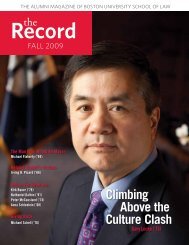the nature of representation: the cherokee right ... - Boston University
the nature of representation: the cherokee right ... - Boston University
the nature of representation: the cherokee right ... - Boston University
Create successful ePaper yourself
Turn your PDF publications into a flip-book with our unique Google optimized e-Paper software.
134 PUBLIC INTEREST LAW JOURNAL [Vol. 15<br />
Though Cherokee “writings depicted <strong>the</strong> war as a phenomenon almost completely<br />
external to <strong>the</strong> Cherokees, a scourge emanating from <strong>the</strong> United States,” Cherokee<br />
treachery arguably voids <strong>the</strong> earlier treaty delegate provision. 218 Ross lived in<br />
Washington, D.C. for most <strong>of</strong> <strong>the</strong> Civil War where he attempted to limit <strong>the</strong> effect<br />
within <strong>the</strong> U.S. government <strong>of</strong> <strong>the</strong> Cherokees’ having earlier signed a treaty with<br />
<strong>the</strong> Confederates while he was <strong>the</strong> Cherokee leader. 219 A speech John Ross gave in<br />
1861 helps explain <strong>the</strong> Cherokee allegiance: “Our Geographical position and<br />
domestic institutions allied us to <strong>the</strong> South while <strong>the</strong> developments daily made in<br />
our vicinity and as to <strong>the</strong> purposes <strong>of</strong> <strong>the</strong> war waged against <strong>the</strong> Confederate States<br />
clearly pointed out <strong>the</strong> path <strong>of</strong> interest.” 220<br />
Cherokees and <strong>the</strong>ir advocates become apologists when discussing <strong>the</strong> Cherokee<br />
role in <strong>the</strong> Civil War. Relying upon Ross’s reluctance to join <strong>the</strong> Confederacy and<br />
<strong>the</strong> divisions among <strong>the</strong> Cherokees between those who supported <strong>the</strong> Union and<br />
those who did not, <strong>the</strong>y attempt to deflect attention from <strong>the</strong> <strong>of</strong>ficial Cherokee<br />
nation’s allegiance with <strong>the</strong> Sou<strong>the</strong>rn states. Doing so requires downplaying <strong>the</strong><br />
fact that Ross himself was a slave owner and <strong>the</strong> “domestic institutions” he<br />
euphemistically referred to in his speech were tied to slavery. 221<br />
Following <strong>the</strong> Civil War, Cooley, <strong>the</strong> U.S. agent assigned to negotiate new<br />
treaties with <strong>the</strong> rebelling tribes, “declared that those tribes or bands which had<br />
made treaties with <strong>the</strong> Confederacy had by that action forfeited ‘all <strong>right</strong>s to<br />
annuities, lands, and protection, by <strong>the</strong> United States.’” 222 However, Ross, from<br />
his deathbed, succeeded in signing a treaty that he supported and which,<br />
significantly, “provided that all previous treaties would be in force, except as<br />
abrogated by <strong>the</strong> present treaty. This repudiated Cooley’s declaration at Fort<br />
Smith that <strong>the</strong> Cherokees had forfeited all previous <strong>right</strong>s due to <strong>the</strong>ir connection<br />
with <strong>the</strong> Confederacy.” 223<br />
Ross’s political maneuvering during <strong>the</strong> Civil War seems to have paid<br />
dividends. According to Cherokee memorials and as witnessed by <strong>the</strong> <strong>the</strong>n<br />
Commissioner <strong>of</strong> Indian Affairs, W. P. Dole, in December, 1862, and <strong>the</strong> summer<br />
<strong>of</strong> 1863, President Lincoln pledged to Chief Ross that <strong>the</strong> Confederate treaty <strong>of</strong><br />
alliance “should never rise up in a judgment against <strong>the</strong> Cherokees, nor stand in<br />
<strong>the</strong> way <strong>of</strong> perfect justice being done under <strong>the</strong>ir treaties with <strong>the</strong> United States.” 224<br />
Though Cooley initially repudiated all clauses and obligations arising under pre-<br />
Civil War treaties, <strong>the</strong> final reconstruction treaty, while stripping <strong>the</strong> Cherokees <strong>of</strong><br />
additional land, reaffirmed prior Cherokee <strong>right</strong>s, including <strong>the</strong> delegate<br />
218<br />
DENSON, supra note 8, at 87.<br />
219<br />
Id.<br />
220<br />
John Ross, Annual Message (Oct. 9, 1861), in 2THE PAPERS OF CHIEF JOHN ROSS,<br />
supra note 14, at 493.<br />
221<br />
See discussion supra note 21.<br />
222 Paul F. Lambert, The Cherokee Reconstruction Treaty <strong>of</strong> 1866,12JOURNAL OF THE<br />
WEST 471, 472 (July 1973).<br />
223<br />
Id. at 477.<br />
224 WARDELL, supra note 173, at 196.









